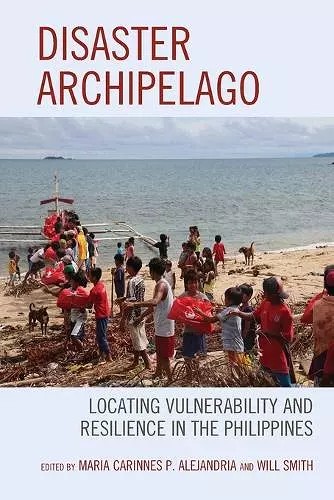Disaster Archipelago
Locating Vulnerability and Resilience in the Philippines
Will Smith editor Maria Carinnes P Alejandria editor
Format:Paperback
Publisher:Lexington Books
Published:5th Apr '23
Should be back in stock very soon
This paperback is available in another edition too:
- Hardback£109.00(9781498569934)

Images of the devastation wreaked by typhoons, flooding, earthquakes and drought in the Philippines circulate globally as an important part of disaster discourses. This collection seeks to move beyond these simplistic representations of calamity by bringing together a group of Filipino and international scholars from diverse disciplinary backgrounds to grapple with the complex nature of disaster in the Philippines. Firmly grounded in the relationship between disaster and place, the volume’s contributors confront the challenges of the Philippine nation’s internal heterogeneity of language, ethnicity and class. In doing so, this book seeks to engage the specificities of place amid diversity, and explores two broad but interrelating avenues of investigation through case studies drawn from across the archipelago: How can environmental extremity in the Philippines help us understand disasters? How can disasters help us understand the Philippines?
The Philippines is one of the most disaster-prone countries in the world, and this edited collection brings together several anthropological studies examining disaster management in the island nation. Each chapter is a separate study focusing on a different disaster management issue or on a community or population that was devastated by disasters such as typhoons or earthquakes. The studies investigate disaster coping strategies, including humanitarian intervention, protection of vulnerable populations, post-disaster accountability, disaster resilience, insecurity and inequality of livelihood supplies, community-engaged aid programs, and implementation and evaluation of aid programs, among others. Chapters also examine social and cultural factors that impact and are impacted by coping strategies, such as local and federal governance, political-economic constraints, disaster preparedness by communities and the government, and the role of sociocultural traditions in coping with disasters. Importantly, disasters are not only viewed as natural phenomena but also as social justice issues. Overall, the anthropologists and scholars who contribute to this volume provide a panoramic view of disaster management in the Philippines as well as useful insights for global disaster studies. Summing Up: Recommended. Upper-division undergraduates through faculty; professionals.
* Choice Reviews *Disaster Archipelago: Locating Vulnerability and Resilience in the Philippines provides a rich diversity of perspectives and lived experiences of disaster in the Philippines. The accounts in this volume are deeply rooted in the multifaceted impacts of colonialism in the Philippines—physical, historical, political, economic, and social—and the subsequent ways this history has been experienced by a diversity of communities across the country. This book offers an accessible and important exploration into the diverse ways in which communities grapple with disaster. -- Vincenzo Bollettino, Harvard University
In this collection, Maria Carinnes P. Alejandria and Will Smith demonstrate that all humanitarian emergencies, regardless of their proximal causes, are culturally constructed. By grounding the experience of disaster in the Philippines in the lives of a diverse range of communities, the contributors clarify the various forces—social, economic, political, cultural, demographic, and public health—that shape the complex interactions between natural hazards on the one hand and the two-sided coin of human vulnerability and resilience on the other. A natural hazard may toss that coin, but humans have always determined what is engraved on either side, and, therefore, the potential outcomes of the coin toss. -- Adam C. Levine, Brown University
Critically reframing reified and essentialized notions of disaster in the Philippines, this edited volume offers a fresh interdisciplinary perspective on the scaled challenges of comprehending, responding to, and overcoming the discursive and material manifestations of disaster across the archipelago. From locally situated ethnographic study to critical policy–practice analysis, Disaster Archipelago: Locating Vulnerability and Resilience in the Philippines offers us a diverse and exciting range of critical scholarship that successfully reframes long-standing understandings and responses to disasters. -- Wolfram Dressler, University of Melbo
ISBN: 9781498569958
Dimensions: 223mm x 154mm x 18mm
Weight: 490g
306 pages